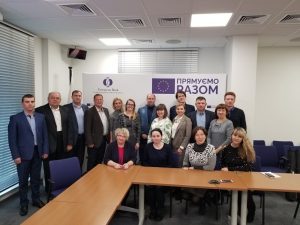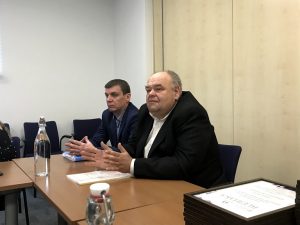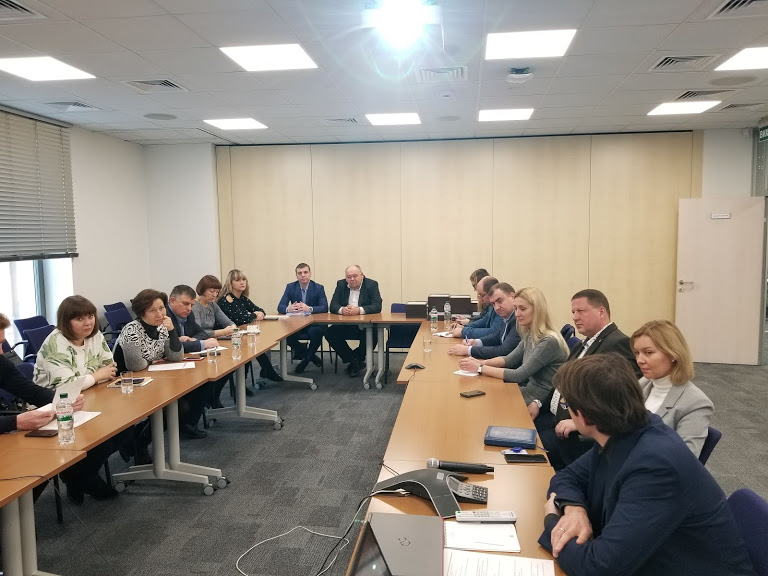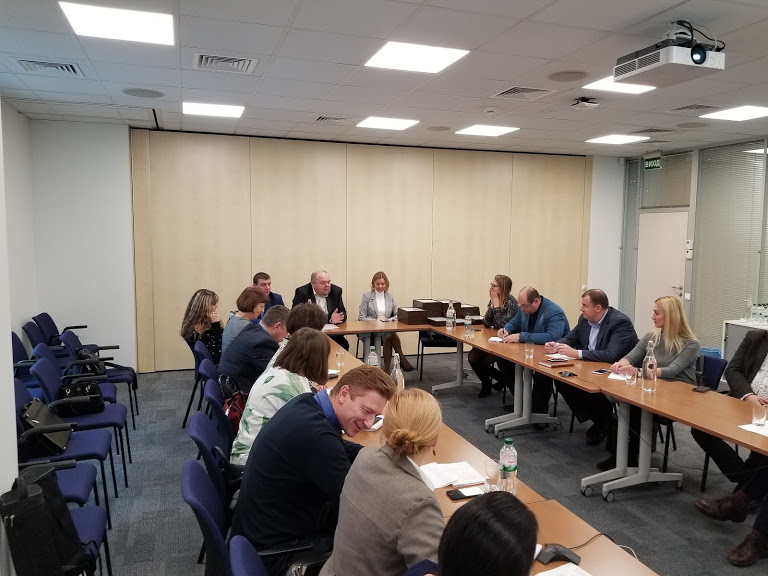FAO / EBRD Technical Assistance Project in the fight against African swine fever in Ukraine
 This project was implemented by modernizing the tool base of diagnostic tests – by providing devices for polymerase chain reaction (PCR) designed for ASF testing to regional laboratories and branches of the State Research Institute for Laboratory Diagnostics and Veterinary Sanitary Examination,training of laboratory staff and master’s students (project participants) in the method of PCR research, changes in approaches to teaching methods for master’s students (change in the teaching paradigm – from “how not to” – to “how to do”) – demonstration of the benefits of using information technology in obtaining knowledge and making suggestions for adjusting curricula and programs for training, retraining and advanced training of veterinary medicine specialists in epizootology, epizootic surveillance based on risk analysis, measures to improve biosafety of farms, expanding the range of diagnostic tests for infectious animals using the PCR method, improving methods for preventing ASF and eliminating outbreaks, in accordance with the requirements of the time, explaining the state of epizootic threats and methods of active counteraction to infections.
This project was implemented by modernizing the tool base of diagnostic tests – by providing devices for polymerase chain reaction (PCR) designed for ASF testing to regional laboratories and branches of the State Research Institute for Laboratory Diagnostics and Veterinary Sanitary Examination,training of laboratory staff and master’s students (project participants) in the method of PCR research, changes in approaches to teaching methods for master’s students (change in the teaching paradigm – from “how not to” – to “how to do”) – demonstration of the benefits of using information technology in obtaining knowledge and making suggestions for adjusting curricula and programs for training, retraining and advanced training of veterinary medicine specialists in epizootology, epizootic surveillance based on risk analysis, measures to improve biosafety of farms, expanding the range of diagnostic tests for infectious animals using the PCR method, improving methods for preventing ASF and eliminating outbreaks, in accordance with the requirements of the time, explaining the state of epizootic threats and methods of active counteraction to infections.

In the course of the project, technical requirements for the introduction of zoning / regionalization of the territory of Ukraine were developed in accordance with EU Directive 2014/709 / EU and the protocol of active epizootic surveillance based on risk analysis, taking into account:
- • localization of pigs and farms, distances to ASF-infected facilities (forests, parks, reserves and sanctuaries), exclusion zones with registered cases of ASF among wild pigs, transport routes and highways, air, railway and river ports, sales markets of animals and pig products, veterinary and sanitary plants, points for disposal of carcasses and animal waste (Bekari pits), etc .;
- stocking density of domestic and wild pigs;
- level of biosafety of pig farms;
- specificity and sensitivity of laboratory research methods, measures to prevent the dispersal of the pathogen during the transportation of biological and pathological material;
- the possibility of the influence of other factors, in particular:
- the effectiveness of legislation regarding the identification of animals,
- mechanisms for controlling the movement of animals and pig products,
- the procedure for seizure of suspicious animals or products of dubious origin during transportation and their disposal,
- the degree of awareness of the population, animal owners, carriers and veterinary specialists about ASF,
- rapid notification and response mechanism,
- the method of implementation of anti-epizootic measures (readiness of coordinated interaction of structures and personnel of farms for joint efforts in a state of emergency),
- evaluation of the results of the epizootic investigation of suspicious cases and the effectiveness of the conclusions (punishment of violators and compensation to injured animal owners) etc.
The implementation of these tasks involved theoretical (classroom and distance) and practical training of students of three universities – on the basis of regional laboratories of veterinary medicine and market laboratories under the guidance of a national laboratory diagnostics consultant with field expeditions for active epizootic surveillance with sampling for laboratory tests, the results of which will serve as a basis for recommendations to the competent authority in terms of preventing the spread of infectious diseases of animals, including ASF.
On March 16, 2018 at the Department of Epizootology and Parasitology, Faculty of Veterinary Medicine, Odessa State Agrarian University in the framework of the FAO / EBRD technical assistance project in the fight against African swine fever in Ukraine a meeting was held between project participants – UN FAO / EBRD (Oksana Sergiivna Yurchenko and Volodymyr Volodymyrovych Polishchuk), a representative of the Mykolayiv RDLVM, employees of the Department of Epizootology and Parasitology (Oleg Hryhorovych Humenny – head of the department, L.P. Michelson, L.V. Perotska – associate professors, I.M. Popova – assistant of the department) and students to demonstrate advantages of using information technology in gaining knowledge and registration for the distance learning course “Laboratory diagnosis of ASF”.
During the meeting, project consultants:
- Oksana Yurchenko, national expert/employee for communication between the participants of the expert group – acquainted the participants with the project, features of its financing, sequence and order of work and obligations of the project participants, mechanism of coordination of the university with the laboratory and features of effective communication;
- Volodymyr Polishchuk, FAO National Consultant on Epizootology – presented a system of mutual information of project participants, which will ensure the possibility of operational interaction between: universities, laboratories, Main Departments of the State Food and Consumer Services of Ukraine, experts and consultants – participants, based on public web-resource (asfld.vet .ua) and tools of mutual information integrated into it, as well as acquainted the participants of working groups (teachers and students) involved in future sampling with distance learning technology and distance learning course “Laboratory diagnosis of ASF”, which sampling participants are required to complete successfully, prior to field missions.
At the end of the meeting with students, project participants discussed a joint action plan and the procedure for interaction between structural units involved in the project at the local level – University (Department of Epizootology and Parasitology), Mykolayiv RSLVM and the Head department of the State Food and Consumer Services in the Mykolaiv region, on the specifics of sampling by direct project participants at the local level, training of the representative of the Mykolaiv regional laboratory to features of PCR-RF diagnostics in the reference laboratory, with the subsequent training of a technique of PCR diagnostics of participants of the project (teachers of department and students), the state of providing project participants with overalls and supplies (gowns, boot covers, tools and materials for selection, packaging and transportation of selected samples).
The meeting was held in an atmosphere of the mutual understanding of the relevance of the problem and ways to solve it and was extremely useful for all project participants.

